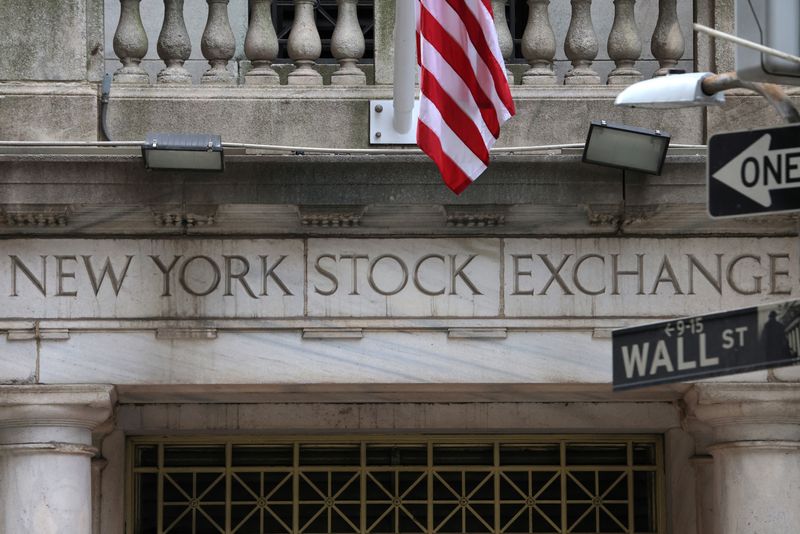By John McCrank, Medha Singh and Chuck Mikolajczak
NEW YORK (Reuters) -A glitch at the New York Stock Exchange prevented the opening auctions for a slew of stocks on Tuesday, prompting widespread trading halts, confusion over whether orders were being filled at correct prices, and trades in more than 250 securities being busted.
The NYSE, which is owned by Intercontinental Exchange (NYSE:ICE) Inc, said a "system issue" prevented the opening auctions in a subset of its listed securities. The stocks began trading without an opening print, causing erroneous prices that the exchange said will be declared null and void.
"Such events are extremely rare, and we are thoroughly examining the day's activity to assure the highest level of resilience in our systems," NYSE's Chief Operating Officer Michael Blaugrund said in a statement.
NYSE ended the day with a normal market close and expected a regular open on Wednesday, Blaugrund added.
A spreadsheet released by the exchange showed 251 affected securities.
The glitch - the most recent in a series since the "flash crash" of 2010 - impacted stocks of major companies including ExxonMobil (NYSE:XOM), 3M, Verizon (NYSE:VZ), McDonald's Corp (NYSE:MCD), Wells Fargo (NYSE:WFC) and WalMart. The companies did not immediately respond to a request for comment.
"What appears to have happened is a technical glitch where all of my opening orders on the NYSE autocancelled even though some of them should have been fulfilled," said Dennis Dick, trader at Triple D Trading.
"They have corrected that now, but this is going to be a big mess to clean up."
The U.S. Securities and Exchange Commission said it was reviewing the issue.
The exact cost of the fallout from the glitch is unclear, but the cost to brokers and retail traders is likely to be in the eight-figure range, according to a person at a major brokerage who spoke on condition of anonymity because the matter is sensitive.
"Obviously, there were a lot of stocks that had major issues," said Joe Saluzzi, co-manager of trading at Themis Trading in Chatham, New Jersey. "It's a bit of a mess."
Saluzzi said there was "zero failure tolerance" among traders for glitches at the key open and close of trading.
"This is a failure, there is no sugarcoating it," said Saluzzi. "There are definitely people who are losing money today who are not happy."
The opening auction gaffe comes as the SEC is considering routing most retail stock orders through auctions, with the aim of getting individual investors better prices.
"The SEC's plan to make us all cool and groovy with consumer auctions leaves a lot to be desired," said James Angel, a finance professor at Georgetown University.
"Auctions are a lot more complicated than it looks. Lots of things can go wrong," said Angel, who helped work on Nasdaq Inc's auction process.
The NYSE-listed stocks trade on all 16 U.S. stock exchanges, which use the NYSE's prices.
Saluzzi said that having multiple exchanges does not help in a situation like this as the only place to trade an opening order on a New York Stock Exchange-listed stock is that exchange itself.
The NYSE is the only major U.S. stock exchange that still uses a trading floor, along with electronic trading, a hybrid model the exchange says facilitates price discovery during market opens, closes, and during periods of trading imbalances or instability.
Technical errors at exchanges can erode market confidence.
"I had a few discretionary trades to place but chose to wait an additional 30 minutes or so after things seemed to normalize to be sure there were no issues," said Seth Hickle, derivatives portfolio manager at Innovative Portfolios in Indianapolis, Indiana.

To hold exchanges accountable for such glitches, the SEC adopted a sweeping set of business continuity and disaster recovery rules called regulation system compliance and integrity (Reg SCI) in 2014.
In March 2018, the NYSE was the first exchange fined under Reg SCI. The $14 million fine partly related to a nearly four-hour trading halt in July 2015 that resulted from a flawed software rollout.